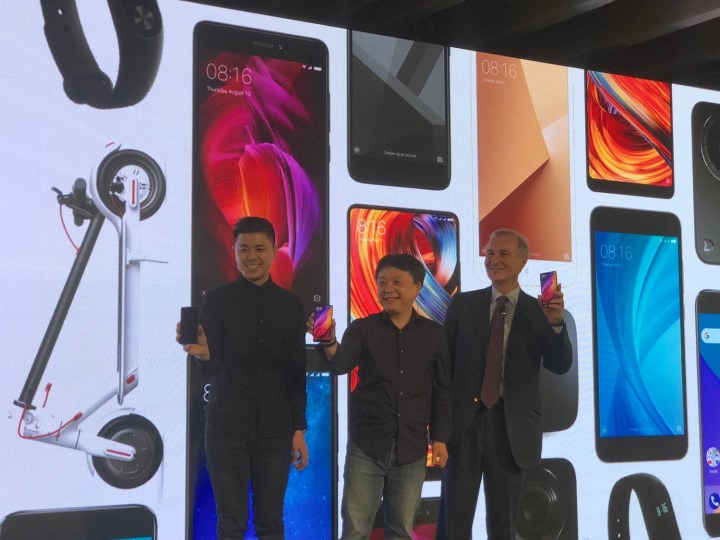
What’s Xiaomi selling in Spain? The Mi Mix 2 is the headline device, along with the Android One Xiaomi Mi A1, two almost brand-new phones announced by the company a few months ago. The Mi Mix 2 is its second bezel-less device, and it’s a real step forward after the innovative but delicate Mi Mix. The body is still ceramic but it’s grippier, more shapely, and much slimmer at 7.7mm. It’s also a true flagship with a Snapdragon 835 processor, 6GB of RAM, and a 12-megapixel camera with 4-axis optical image stabilization.
It has Android 7.0 Nougat installed with Xiaomi’s MiUI interface over the top, this time with Google Play installed, something that doesn’t happen on the Chinese models. The 6-inch screen extends all the way to the top of the phone, with only a small chin at the other end, where the selfie camera lives. It’s a different approach to Samsung, Apple, and LG, and one which Xiaomi believes singles it out from the crowd. The Mi Mix 2 looks and feels super premium, making the final 500 euro price eye-wideningly tempting, especially considering how expensive 2017 flagship phones have become.
The Mi A1 is at the other end of the scale when it comes to price. It’s 230 euros, but it’s also far from a basic device. The aluminum body houses a 5.5-inch screen and a dual-lens camera, which has a wide-angle and a telephoto lens inside, ready to produce bokeh-style shots with a blurred background. A Snapdragon 625 processor with 4GB of RAM powers Android One, which will be supported with updates from Google for the next two years. It comes with Android Nougat installed, but Android Oreo will arrive before the end of 2017.

That’s not all: Xiaomi will also sell the Mi 6, the Mi Max 2, and several Redmi 4 and Redmi 5 models, which means almost its entire range of current smartphones will be sold in Spain. Additionally, it will also sell Mi Box, the Mi Band 2, the Mi Action Camera 4K, and the Mi Electric Scooter. It’ll do this through its new local online mi.com store from November 8, and in two official Mi retail stores opening on November 11. From November 22, other Spanish retailers will join the fun including Media Markt and Amazon.
Just the beginning?
The official launch also means official after sales support. This will begin with a dedicated team in China, while Xiaomi builds partnerships in Spain. Xiaomi is also planning to open more stores in Spain, including Barcelona. It’s not starting from scratch in Spain either. Prior to any official launch, there were 200,000 MiUI users already, and it will tap into that fanbase to help promote its products now they’re available outside of importers. The target, according to Wang Xiang, Xiaomi’s senior vice president of global operations, is to own 10 percent of the Spanish market after 12 months.
Is the Spanish launch the first of more western European countries for Xiaomi? It remains noncommittal; but didn’t shy away from dropping some hints. It’s paying close attention to the market response to the device lineup, and will use it to judge possible future releases, its Mi Notebook range, for example, and it’s research which could easily be applied to other European countries.
Xiang also repeatedly referred to the European Common Market, saying he sees little reason why those outside Spain couldn’t order a Xiaomi device online. However, we won’t know if this is really possible until after the store opens, and we can see delivery and payment options. He didn’t say more European countries would welcome Xiaomi officially in the near future, but the scale of the Spanish launch shows it’s serious about making it a success. If it is, other countries are sure to follow.




